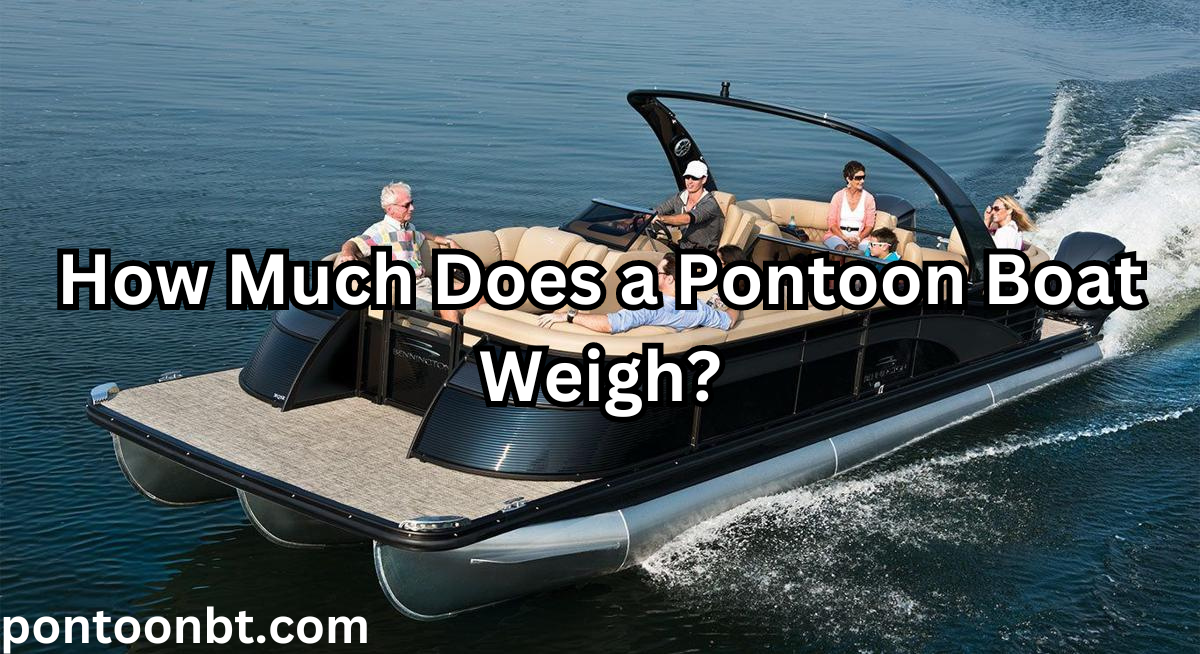Introduction
Pontoon boats have become the preferred choice for boaters because of their stability and versatility. Understanding the amount of the ship’s weight can support vessel is essential for a variety of reasons, including security, safety and efficiency. This guide offers detailed information on the various factors that affect the weights of pontoon boats, the multiple varieties of pontoon boat models and their weights as practical suggestions regarding handling and evaluating this vital part of the boating process.
Different kinds of Pontoon Boats
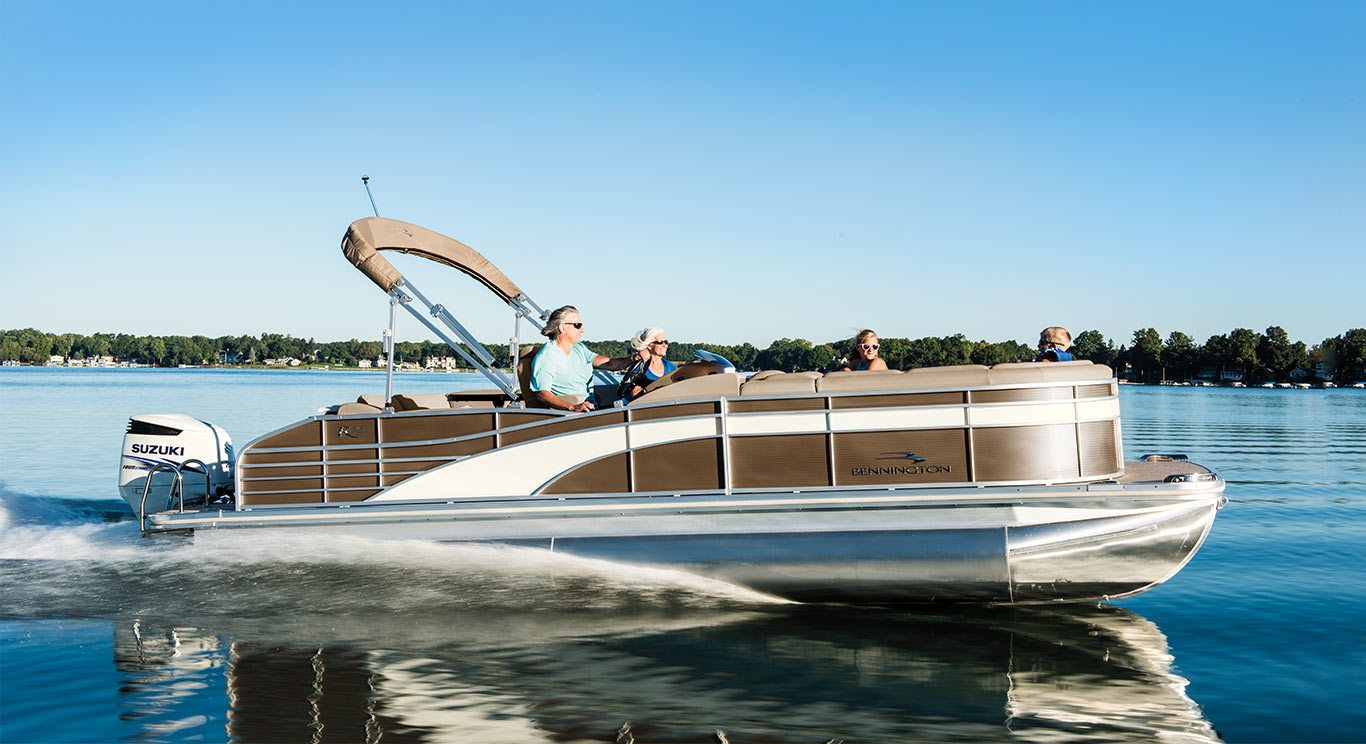
Small Pontoon Boats
Smaller pontoons, usually with a length of between 16 and 20 feet, are great for calm waters and small groups. They’re lightweight, making them easy to move and transport. The typical pontoon boat weighs between about 1200- 1,600 pounds.
Medium-Sized Pontoon Boats
Medium-sized pontoon boats with a length between 21 and 25 feet bring an ideal balance of dimensions and capacity. They’re suitable for all sorts of activities like fishing and outings with the family. They generally weigh about two and two and a half tons.
Large Pontoon Boats
Large pontoon boats ranging between 26 and 30 feet or more have been made to hold large parties and deliver an extravagant experience. They’re outfitted with the latest technology and amenities that lead to an increased weight. The boats may weigh anywhere from up to 3000 pounds and more.
The Amount of Weight the Material
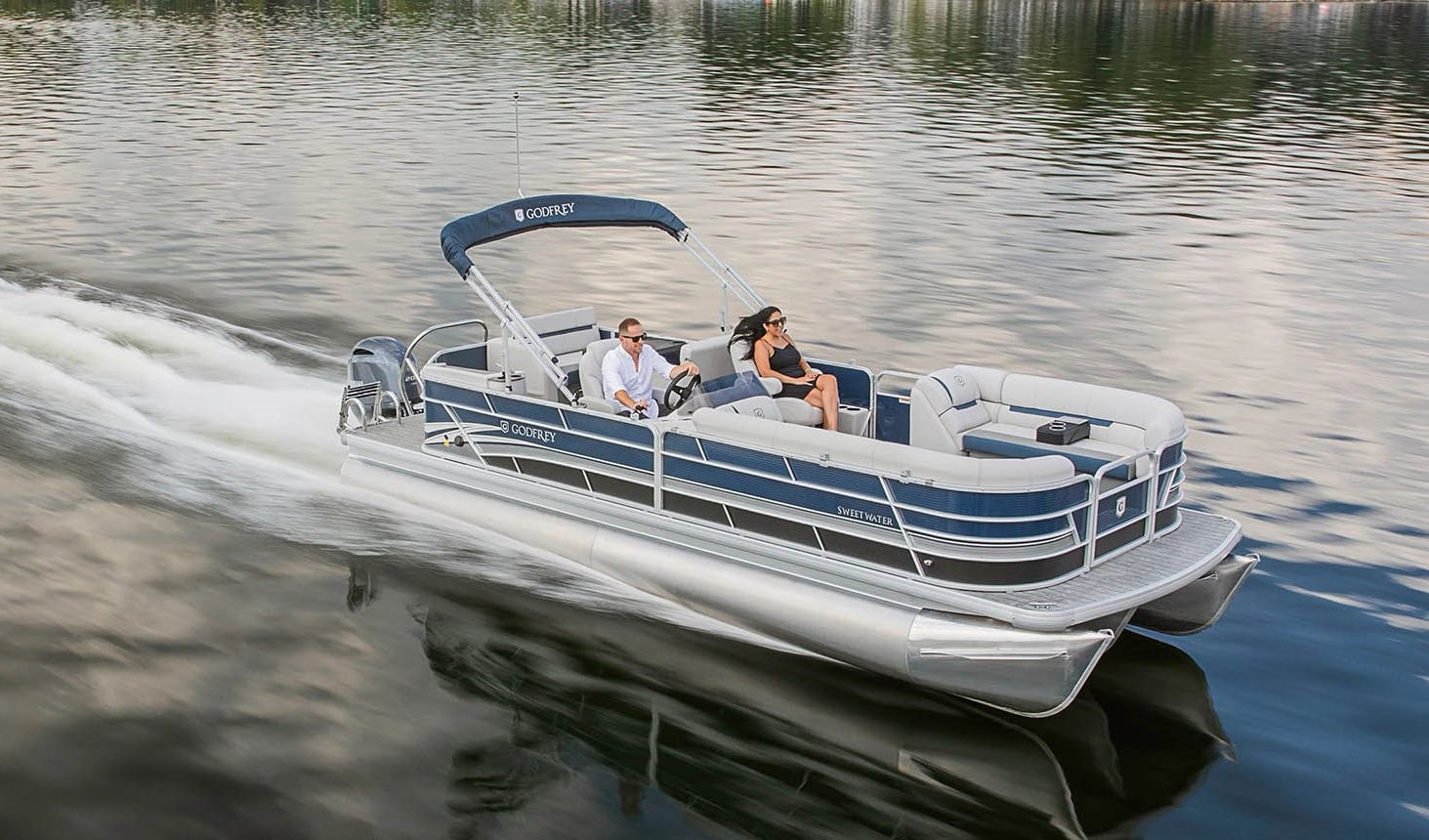
Aluminum Pontoon Boats
Aluminum is the most sought-after pontoon boat material because of its lightweight and long-lasting. The standard pontoon boat made of aluminum weighs less than those made from other materials and has an average weight of 1,500-2,500 pounds.
Steel Pontoon Boats
Pontoons made of steel aren’t so common but they’re renowned for their strength and durability. However, they are significantly heavier, with weights often exceeding 3,500 pounds. They are unsuitable for towing. They are appropriate for towing; however, they are ideal for stability and durability.
Fiberglass Pontoon Boats
Fiberglass pontoon boats sport an elegant design and superb performance. They fall in the middle in weight, generally between 2,000 and 3000 lbs, compatible with the size and other options.
Dimension by Weight
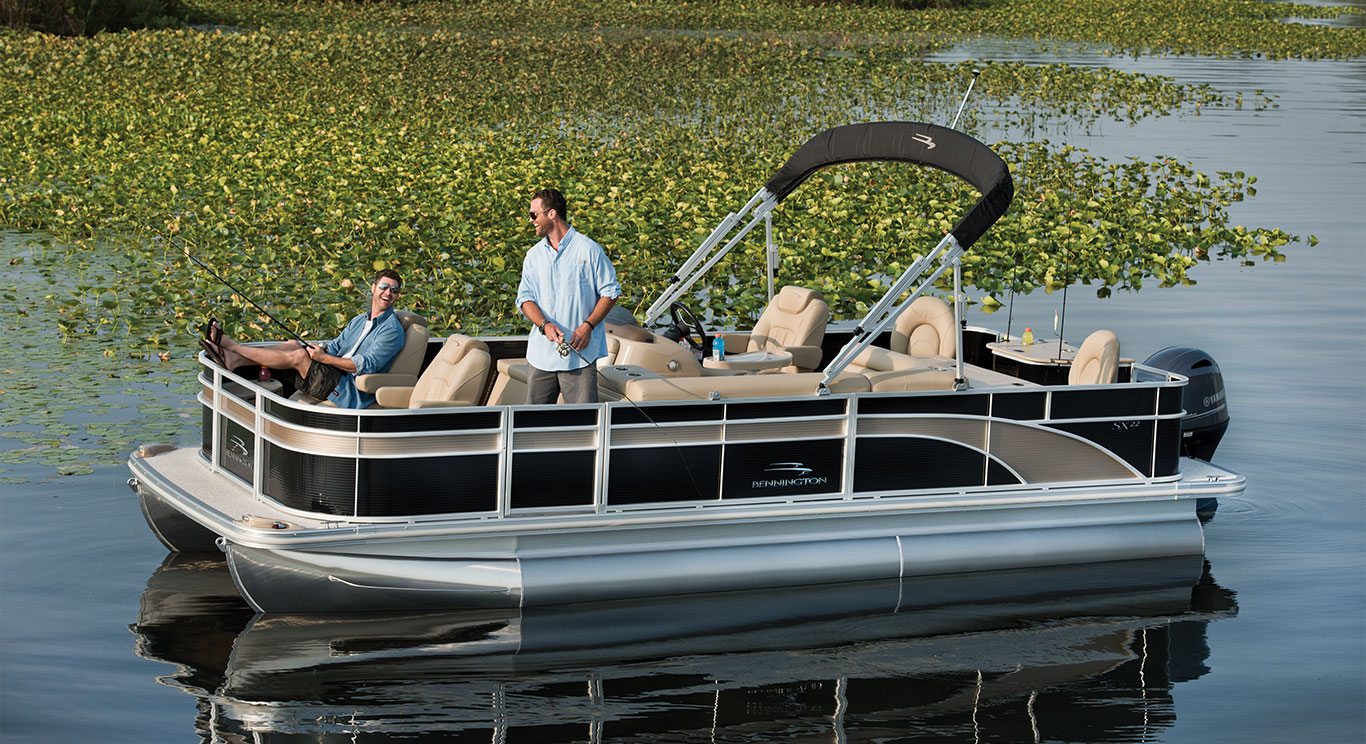
16-20′ Pontoon Boats
These smaller boats work well for those who want simple handling and quick transport. The weight ranges typically between 1200 and 1,800 pounds.
21- 25′ Feet Pontoon Boats
The boats that fall within this size range can be capable of accommodating more people and gear. They usually weigh between 2800 and 1,800 pounds, making them extremely popular for a variety of kinds of.
27-30′ Pontoon Boats
Larger pontoon boats are ideal for long-distance travel and larger gatherings. These boats are large and come with many amenities, which leads to an increase in weight, usually between 3,000 and 4,500 pounds.
The weight of an individual can be calculated by the quantity of time they spend
Recreational Pontoon Boats
The pontoon boat for recreational use is intended to be used for general cruises as well as social events. The weight of the ship can vary in relation to the size and features but typically ranges between 1,500 and 3,500 pounds.
Fishing Pontoon Boats
Fishing pontoon boats are equipped with specific features like rod holders for fishing Live wells and even storage for fishing gear. These additional features can increase the boat’s capacity, which can be an average of between 2,000 and 3,000 pounds.
Luxury Pontoon Boats
The most luxurious pontoon boats come with top-of-the-line amenities like luxurious seating, advanced electronic systems and custom-designed designs. The boats weigh in at the heavier end and can exceed 4000 pounds because of the additional features.
Efficiency and weight
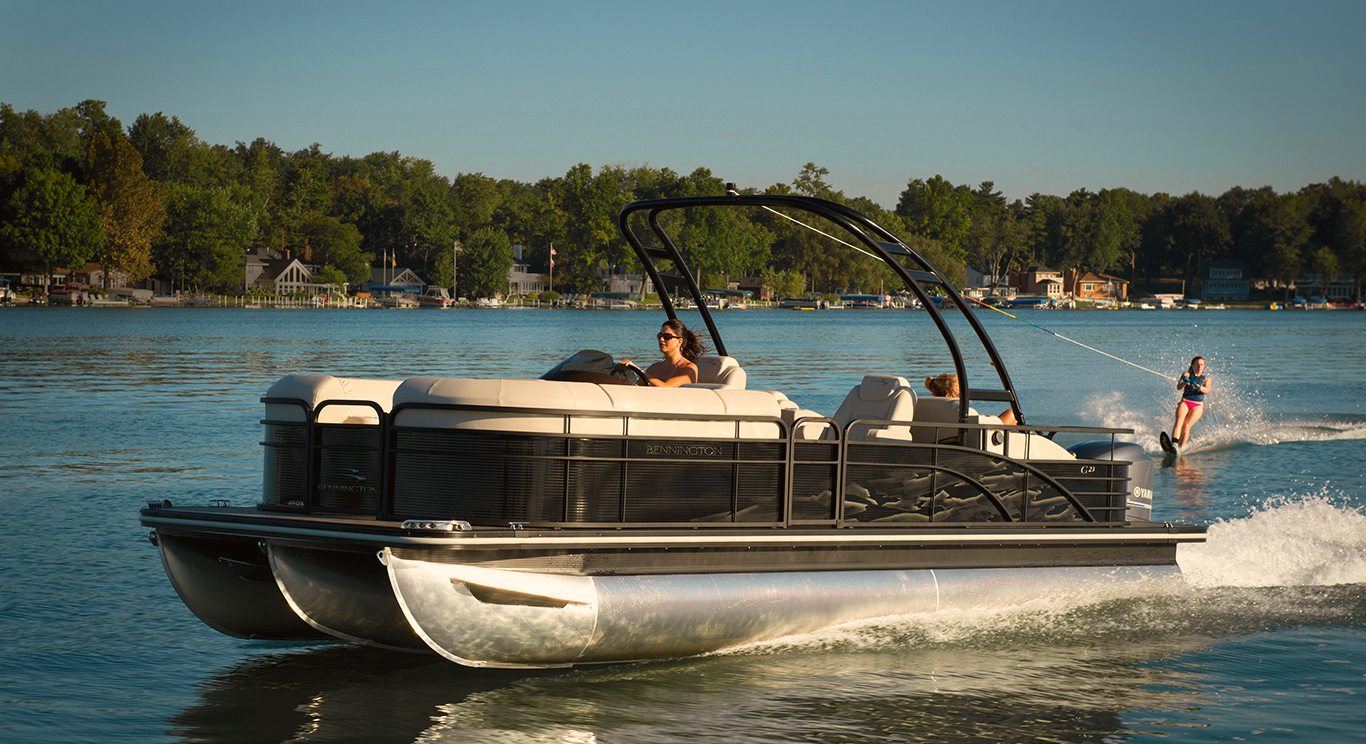
Impact on Speed
The weight of a pontoon boat directly affects its speed. Larger boats require more power to get the same speed as smaller ones. Understanding the weight can help you select the desirable engine to maximize performance.
Impact on the efficiency of the fuel
The weight of your boat can also impact the efficiency of the fuel you use. Larger boats consume more fuel. Therefore, it is crucial to balance the weight with the effectiveness to warrant that you are able to enjoy your boat with efficiency.
Effect on handling
Handling is another aspect that is influenced by weight. Pontoon boats with greater weight tend to be more troublesome for maneuvering, especially in narrow areas or rough water. The right balance between weight and intelligence can boost the boat’s handling.
Security and Weight
The crucial role of weight distribution
Proper weight distribution is crucial to ensure security and effectiveness. Instabilities caused by uneven weight can be a cause of instability, which could increase the possibility of a capsize or cause poor handling. An even weight distribution increases safety and stability.
The Weight The weight limit and Regulations
Certain weight limits and rules apply to pontoon boats. Overstepping these limits can impact security and create legal issues. It is essential to follow the manufacturer’s guidelines as well as local laws.
Safety Tips for Heavy Loaded Pontoon Boats
For boats with many cargo More precautions are required to assure safety. These include monitoring the weather, ensuring that all safety devices are installed on the boat and implementing safe boating practices to reduce risks.
Weight and transportation
Towing Aspects
If you’re towing a pontoon boat the weight is crucial. Check that the vehicle that is towing the trailer can carry the weight of the ship and the additional equipment and passengers.
The types of trailers as well as the weight
Different trailers are designed for various weights. Selecting the right trailer designed to fit the weight of the boat is the accurate way to ensure the security and effectiveness of transportation.
Legal Issues in transporting pontoon boats
The operation of pontoon boats requires adhering to the legal rules, which include the weight limit on highways as well as the need for proper licensing. Being aware of these regulations and adhering to them can benefit avoid legal issues.
Measurement of the weight of a pontoon boat
Methods of Weighing the weight of a pontoon boat
The exact amount of weight of the pontoon can be determined by a variety of methods including a weigh station, portable scales or skilled services.
Tools and Equipment Needed
The most important tools required for weighing the pontoon boat are a portable scale and a sturdy trailer, a grip that is easy to grasp, and a smooth surface. They guarantee accurate measurements and secure handling.
Work-related Weighing Services
Professionally-trained weighing services help provide expert advice and the most recent equipment to measure the accuracy of weight. They help in providing precise details essential for the safety and effectiveness of boating.
Factors that impact the variation in weight
Additional Equipment and Accessories
Additional equipment and accessories such as coolers, fishing gear, and safety gear add to the overall weight the boat can handle. Make sure to consider these elements when planning your excursion and balancing your weight.
Customizations and Modifications
Modifications and personalization, like including seating, storage or electronic space can significantly increase the weight of your boat. Be aware of any changes to assure security and efficiency.
The weight of the cargo and passengers
The weight of the passengers as well as cargo may fluctuate. The aspect that can change at each outing. Take note of the weight of the cargo, as well as passengers, to ensure that you’re not over the weight limit or at risk of compromising security.
Case Studies
Examples of different Pontoon Boat Weights
The actual-world examples of various pontoon boat weigh illustrate the impact of materials size, shape, and use in determining the amount. These case studies provide practical guidelines for handling boat weight with confidence.
The Real-Life Impacts of Use and Performance
Understanding the effects that are real-time for weights that affect pontoon boat performance and its use helps boaters make informed decisions. Understanding the impact of weight on the performance of the motor, its speed, and handling will enhance the experience of boating.
Expert Tips
Discussions with Boat Manufacturers
Interviews with boat builders add important information on the design and construction of pontoon boats, highlighting aspects that impact the performance and weight of the yacht.
Data about Marine Engineers
Marine engineers provide the most trustworthy advice for maintaining the accurate weight, ensuring security and enhancing performance. Their expertise in technology is essential to understanding the complexities of the weight of a vessel.
Tips from experienced Pontoon Owners
Boat owners with pontoon boat expertise offer advice on practical issues and personal experiences about managing the weights of their vessels. These tips will definitely help new boaters when it comes to tackling problems related to weight.
Conclusion
The ability to control the weight of a pontoon boat is essential to ensure safety, performance and general satisfaction. Understanding the elements that influence the weight, along with the right methods to calculate the weight and following the advice of expert boaters can increase the enjoyment of sailing. Being aware of weight limits, making sure there’s a fair distribution of the weight, and understanding the impact that could be a result of additional equipment and passengers are essential steps to ensure a safe and functioning pontoon.
Read More: pontoonbt.com

